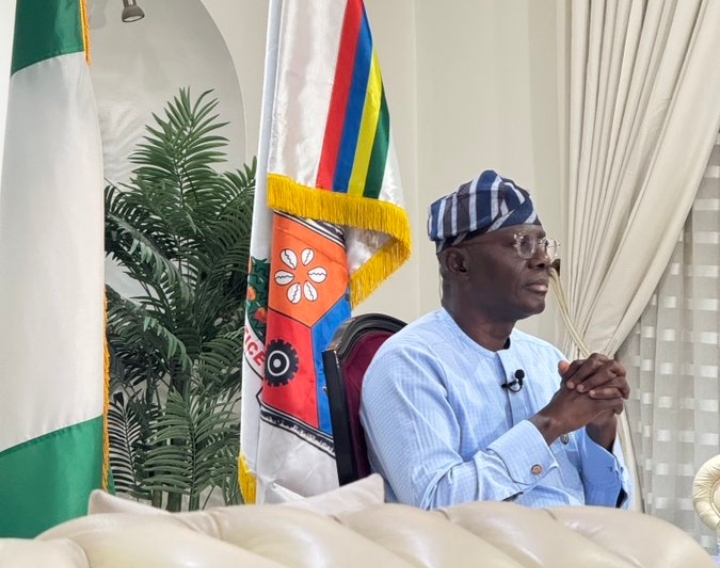Lagos State Governor, Mr. Babajide Sanwo-Olu’s posturing during an interview on national TV recently threw up images of a man superintending over a state with bragging rights to deep treasury. Should this be taken for arrogance or a predilection to intimidate less endowed sub-nationals? Not at all! Remember, however, a popular saying: “If you’ve got it, flaunt it!”
True to the adage and his name, Sanwo-Olu, at dinner time on Wednesday, 16 October, announced a new minimum wage of N85,000 for public servants beginning this October. The amount was N15,000 above N70,000 national minimum and a testament to government’s consistency in providing succour to Lagos civil servants amidst current economic realities.
Unarguably, it was a news item every public servants desired to take to bed, and the governor was reassuring while giving out the information. “I’m glad to let you know that the minimum wage for Lagos, which we have discussed with our union, is N85,000 today. The state is paying N85,000 because it has the capacity to do so”, he dropped the good news. He spoke further: “It is not a competition. So I am not going to say we are paying more than some other people. It is a function of affordability and it is a function of capacity. But we know too well that when people live in Lagos, Lagos has a premium in terms of the cost of living; we are fully aware”.
That Lagos has the capacity to pay more is unassailable. This is a sub-national that grew its budget in five years (2019-2025) from N630 billion to N2.3 trillion in the current year. The projection is to hit N3 trillion in 2025. According to Sanwo-Olu, who raised the possibility of upgrading the minimum wage to N100,000 in January 2025, the decision was not meant to intimidate other sub-nationals. “It’s not because I want to make anybody look bad. It is really because I want my people to have a living wage. I want them to really be able to know that government is working for them”, Sanwo-Olu said.
Compared to the States of California, the largest economy in the United States of America, and Massachusetts which pays above the national minimum wage, Lagos had, and will always set the pace for others in the area of fiscal responsibility. The state also followed suit when the Federal Government announced N35,000 wage award for federal workers as buffer for rising inflation in the country. Hear Sanwo-Olu: “We actually increased salaries earlier in the year. Civil servants and all public officers in Lagos know that since January, we have continued to pay the wage allowance of a minimum of N35,000 over and above what they were earning before. What this means is that people that are earning a minimum of N35,000 or more before are now earning over N70,000. That is what they have been enjoying since January. So it is important for people to know that we make these things very clear that this government has doubled up to ensure that at this difficult time, it has not left the citizens on their own”, the governor said.
It’s interesting how this administration has prioritised workers’ welfare since inception. Aside salary increases, which is statutory, Lagos workers enjoy various perks not in non-monetary terms. These include but not limited to free bus services, substantial discounts on planning permits, and food packs. These efforts reflect government’s holistic approach to enhancing the quality of life of its employees.
With the state’s robust integrated urban transport system, commuting to and from work has been a walk in the park for workers. During the TV appearance, Sanwo-Olu explained how government’s involvement in all strata of urban transportation, including road, water and intra-city trains (Blue and Red lines) were planned with the typical Lagosian in mind. The same goes for the BRT and the waterways, which corridors cut across areas densely populated by the working class.
Take the coverage of the completed Blue and Red Lines. The Blue line, whose second phase is scheduled to be ready in 2026 goes westwards, meandering the thickly populated areas of Mile 2, Orile-Iganmu, Suru Alaba, and ultimately terminating in Okokomaiko. The Red line goes northwards from Oyingbo to Agbado, an Ogun State community. In between both ends are Mushin, Osodi, Ikeja, Agege and Iju. The speed boats and BRT buses are other timely, convenient and pocket-friendly options available to workers.
Based on government’s awareness it needs civil servants to drive its policies, a lot more have been done in the areas of capacity building and giving incentives like timely payment of salaries, retirement benefits, and extension of the work-from-home policy which government introduced in February.
The cumulative of all this is to enhance performance in the work place.

